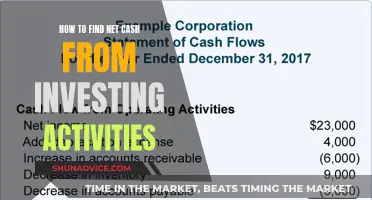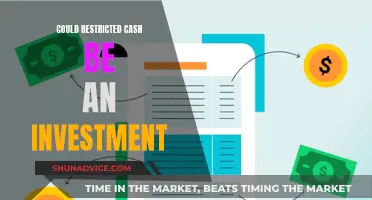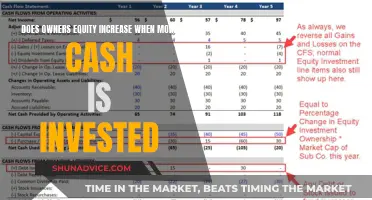
Robinhood is a commission-free trading platform that allows users to invest in stocks, bonds, ETFs, crypto and more. With around 11.4 million monthly active users, it is a favourite among everyday traders who congregate in online forums like Reddit’s r/WallStreetBets. Robinhood has been criticised for its lack of mutual funds and bonds, limited research and data, and serious complaints and lawsuits over the years. However, it is a good option for beginner investors, allowing them to trade stocks, bonds, ETFs, crypto and more with a minimum investment of $1.
| Characteristics | Values |
|---|---|
| Account fees | No annual or inactivity fees. $100 ACAT outgoing transfer fee. Robinhood Gold costs $5 a month. |
| Interest rate on uninvested cash | 0.01% for free accounts, 4.5% for Gold accounts. |
| Investment options | Stocks, ETFs, Options, Cryptocurrency, American Depositary Receipts for over 650 global companies, Fractional shares. Bonds only available in the form of bond ETFs. |
| Number of no-transaction-fee mutual funds | N/A |
| Customer support | 24/7 chat support. Phone support available from 7:00 a.m. ET to 9:00 p.m. ET, Monday - Friday. |
| Minimum age requirement | 18 years or older |
| Minimum investment | $1 |
What You'll Learn

Robinhood's ease of use and accessibility for beginner investors
Robinhood is designed to provide easy access to the stock and crypto markets. The app offers a streamlined, approachable, and easy-to-navigate trading platform, plus extremely low costs, which beginner investors tend to prioritise.
The sign-up and account funding process is quick and painless. It all happens within the app in a matter of minutes, with just a few questions to gather personal information, contact details, and bank details. Robinhood uses instant verification with many major banks, saving users the hassle of reporting micro-deposits to verify their account. This means bank transfers of up to $1000 are available instantly for investing.
Robinhood's default buy order is an order to buy a number of shares or a dollar amount of the specified stock or ETP. During regular market hours, dollar-based buy orders are market orders, and share-based buy orders are limit orders with a preset limit price. Outside of regular market hours, dollar-based and share-based buy orders are queued for the opening of regular market hours.
Robinhood's mobile and web platforms are known for their smooth sign-up, funding, and trading processes. The broker now also offers a desktop platform, Robinhood Legend, with more advanced charting features and customisable layouts.
The app is popular among young, first-time investors, and the company has targeted younger investors specifically. Last fall, Robinhood gave college students $15 to trade if they opened a new account.
However, critics say the way Robinhood makes investing akin to a game is dangerous, as overtrading can have serious consequences. The company has made some adjustments in the face of this criticism, such as getting rid of its digital confetti.
Broker or DIY: Navigating Your Investment Journey
You may want to see also

The ability to trade stocks, bonds, ETFs, crypto and more
Robinhood is a commission-free trading platform that allows users to invest in stocks, bonds, ETFs, and cryptocurrencies.
Stocks
Robinhood allows users to buy and sell stocks from a variety of industries and companies. The platform provides information on a stock's historical performance, analyst ratings, company earnings, and other details to help users make informed decisions. It also offers fractional shares, enabling investors to invest in a diverse range of companies with a small amount of money.
Bonds
While Robinhood does not offer individual bonds, users can access bonds through bond ETFs.
ETFs
Exchange-Traded Funds (ETFs) are similar to mutual funds, where a single investment provides exposure to a mix of different stocks. Robinhood offers a range of ETFs, including index and bond ETFs.
Crypto
Robinhood offers access to a wide range of cryptocurrencies, including Bitcoin, Ethereum, Dogecoin, and more. Crypto trading is available in all U.S. states, except for a few restrictions on specific cryptocurrencies in New York and Texas.
Robinhood provides an easy-to-use platform for investors to trade across various asset classes. However, it is important to do your own research and understand the risks associated with investing before diving into the world of trading.
Quick Ratio: Does It Include Investment Securities?
You may want to see also

The risks of overtrading and the gamification of investing
Overtrading refers to the excessive buying and selling of stocks by either a broker or an individual trader. It is a prohibited practice when brokers trade excessively to generate commission fees. While individual professional traders may also overtrade, this type of activity is not regulated by the SEC.
The SEC defines overtrading (also known as churning) as excessive buying and selling in a customer's account, controlled by the broker, to generate increased commissions. Brokers who overtrade may breach SEC Rule 15c1-7, which governs manipulative and deceptive conduct.
There are several common forms of overtrading that investors may engage in, including discretionary overtrading, technical overtrading, and shotgun overtrading. Discretionary overtrading occurs when a trader uses flexible position sizes and leverage without establishing rules for changing size, often leading to the trader's downfall. Technical overtrading happens when traders new to technical indicators use them to justify predetermined trades, allowing them to feel more comfortable. Shotgun overtrading is when traders crave action and develop a "shotgun blast" approach, buying anything they think might be good.
To prevent overtrading, investors can exercise self-awareness, take breaks from trading, create rules for entering trades, and commit to risk management.
Gamification of investing refers to the addition of game-like features to investment apps, making the user experience more intuitive, exciting, or visually appealing. While it can make stock trading more accessible and fun, it can also promote strategies that benefit brokerages rather than investors.
One example of gamification is the emphasis on trending stocks, highlighting those with significant price swings, which can funnel investors into volatile choices that are not guaranteed to be profitable. Gamification can also lead to inadequate disclaimers and disclosures, as light-hearted interfaces may leave little room for important information.
The use of celebratory feedback, such as confetti after placing a trade, may encourage excessive trading. Social media can also promote dubious investments, making it easier for hypesters to promote risky investments.
Gamification can drive investor engagement and literacy, especially among younger generations, but it can also drive excessive trading, encourage trading in complex or risky products, and promote other harmful investor behaviours.
To protect yourself from the risks of overtrading and the gamification of investing, it is essential to educate yourself about reliable investment strategies and the mechanics of popular asset classes. Following a long-term investment strategy, staying away from impulsive decisions, and allowing time for reflection before making trades can also help mitigate these risks.
Maximizing Investment Returns: Timing Your Cash Withdrawals
You may want to see also

The low costs and free stocks offered by Robinhood
Robinhood is a commission-free trading platform, meaning users can invest in everything from exchange-traded funds (ETFs) to Dogecoin without going through a traditional brokerage. Robinhood offers free stock, options, ETF and cryptocurrency trades, a 1% match on IRAs, and its account minimum is $0. Mutual funds and individual bonds aren't offered.
Robinhood is a true discount broker, with some of the lowest costs in the industry. This includes options trades, which don't carry a contract fee. It also offers access to more cryptocurrencies than any other stock trading app. However, if you compare Robinhood’s crypto offerings with pure-play crypto brokerages, that shine starts to fade. Crypto is also not available in Robinhood IRAs.
Robinhood offers some of the lowest margin rates of any broker: just 5.7% to 6.75%. Its mobile and web platforms are known for their smooth sign-up, funding and trading processes. The broker now also offers a desktop platform, Robinhood Legend.
Robinhood's taxable brokerage accounts allow margin trading, but margin trading is not available in IRAs. Robinhood also offers a spending account that comes with a debit card and $250,000 in Federal Deposit Insurance Corporation insurance via agreements with partner banks.
The platform’s model allows users to make trades at no cost. However, according to financial planner Tara Falcone, that comes at a steep price: "It’s made many people think, 'this is how you invest, this is how you build wealth.' And while trading individual stocks is one way to build wealth, that’s not where most young people should be starting."
Strategies for Investing Cash Reserves: A Guide to Opportunities
You may want to see also

The controversy and criticism surrounding Robinhood
Robinhood Markets, Inc. is an American financial services company headquartered in California. The company provides an electronic trading platform accessible via mobile app that facilitates commission-free trades of stocks, exchange-traded funds, and cryptocurrencies. Robinhood has been the subject of controversy and criticism from various sources, including regulators, politicians, and investors. Here are some key points regarding the controversy and criticism surrounding Robinhood:
Payment for Order Flow:
Robinhood receives a significant portion of its revenue from payment for order flow, which has been criticized as a "backdoor commission" or kickback. The company has been accused of routing orders to market makers that pay the most instead of those that offer the best order execution. In December 2019, the Financial Industry Regulatory Authority (FINRA) fined Robinhood $1.25 million for failing to ensure that its customers received the best prices for orders.
Gamification Accusations:
Robinhood has been criticized for gamifying the serious business of investing, with features like falling confetti and emoji-filled notifications that make it feel like a game. In December 2020, the Securities Division of the Massachusetts Secretary of the Commonwealth filed a complaint alleging that Robinhood exploits novice investors with gamification.
Security Breaches:
Robinhood has experienced several security breaches, including a 2019 incident where customer passwords were stored in an unencrypted cleartext format, and a 2020 breach where nearly 2,000 accounts were compromised and customer funds were siphoned off. In 2021, a voice phishing scheme resulted in the personal information of millions of customers being stolen.
Infinite Leverage Glitch:
In November 2019, a user on the r/WallStreetBets subreddit shared a glitch that allowed Robinhood Gold users to borrow unlimited funds. The loophole was quickly closed, but some accounts recorded six-figure losses.
Mobile App Outages:
In March 2020, Robinhood suffered system-wide outages that prevented users from accessing the mobile app during a period of high trading volume. The company was fined $57 million by FINRA and ordered to pay $13 million in restitution to affected clients.
Suicide of Alexander E. Kearns:
In June 2020, a 20-year-old Robinhood user committed suicide after seeing a negative cash balance of $730,000 in his margin trading account. Kearns' family filed a wrongful death lawsuit, alleging that Robinhood allowed him to take on too much risk and failed to respond timely to inquiries about the negative balance.
Violation of Anti-Money Laundering Rules:
In August 2022, Robinhood's cryptocurrency division was fined $30 million by the New York State Department of Financial Services for allegedly violating anti-money-laundering and cybersecurity regulations.
Bankruptcy Tag on AMC Stock:
In May 2023, Robinhood briefly added a bankruptcy tag to AMC Theatres stock, leading to criticism and threats of legal action from AMC's CEO.
GameStop Short Squeeze and Possible Insolvency:
In January 2021, Robinhood restricted the trading of certain stocks, including GameStop, to meet collateral requirements. The decision sparked widespread criticism and protests, with customers and politicians accusing the company of unfairly favoring institutional investors.
Unleash Your Sofi Invest Bonus: A Step-by-Step Guide
You may want to see also







